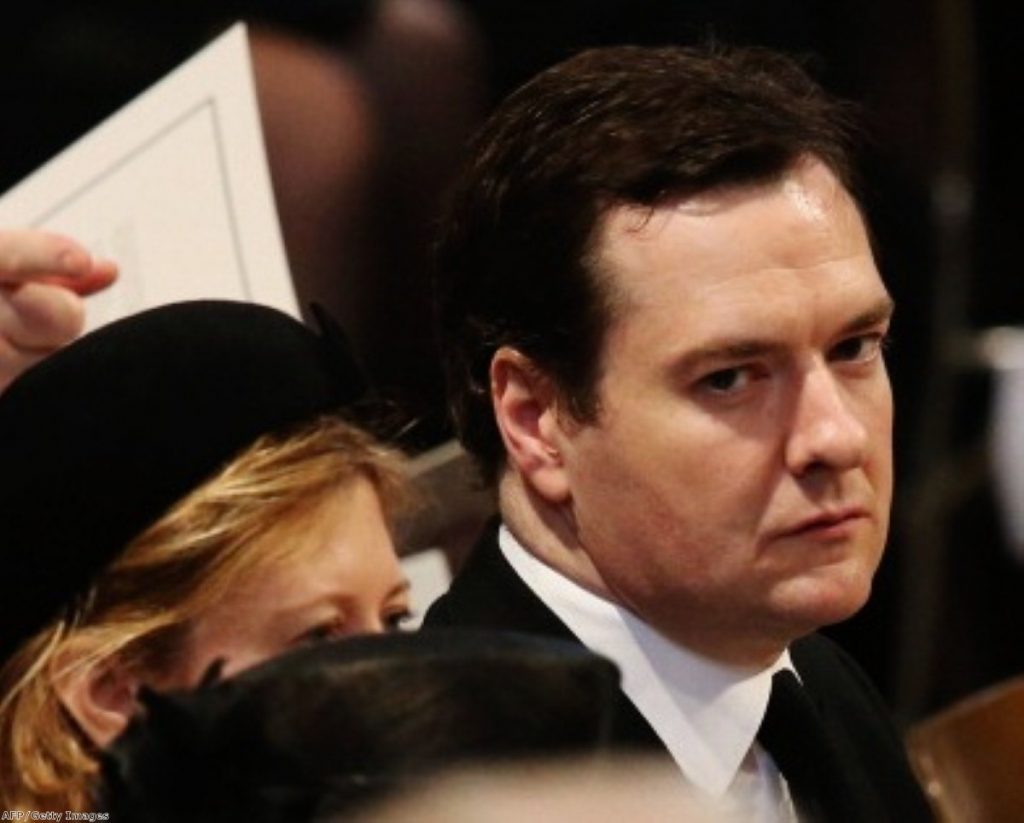Something to cry about: Deficit reduction grinds to a halt
George Osborne faced some painful borrowing figures this morning, after admitting he "occasionally" sheds a tear.
On the bright side, public sector net borrowing has fallen by £1.6 billion from £16.7 billion in March 2012 to £15.1 billion in March 2013, the Office for National Statistics confirmed.
But when the effects of the transfer of the Royal Mail pension plan and the Bank of England's asset purchase facility fund to the government are removed, the first estimate of net borrowing in 2012/13 is similar to last year's £120 billion.
This suggests the chancellor's programme of harsh spending cuts is making no progress in reducing the deficit.


Furthermore, the public sector current budget deficit in March 2013 was £10.6 billion, up on the £9.7 billion deficit registered 12 months ago.
And underlying public sector net debt at the end of March 2013 stood at 75.4% of national income, higher than the 71.8% of national income in March 2012.
The news will be painful for the chancellor, whose frustrated economic strategy is now in such disarray rumours about his job security are increasingly common across Westminster.
Last night the new Archbishop of Canterbury, Justin Welby, told a Bible Society event he believed Britain had now sunk into a "depression".
"What we are in the moment is not a recession but is essentially some kind of depression," he said.
"It's going to take something very major to get us out of it in the same way as it took something major to get us into it."
Osborne refused to accept that suggestion, simply saying: "I don't use that word."
Last week the IMF withdrew its support for Osborne's strategy of uncompromising deficit reduction, saying weak economic figures meant a rethink was now essential.
"We have said that should growth abate, should growth be particularly low, then there should be consideration to adjusting by way of slowing the pace," Christine Lagarde said. "This is nothing new. And this is still the position and one that has been very clearly articulated within the various departments."
The IMF is heading to London in May for its next assessment of the UK economy. Even if figures out this Thursday covering the first quarter of 2013 do not confirm the UK has slipped into a triple-dip recession, its criticisms could seriously undermine Osborne's position.
"The British economy of course faces very serious economic challenges," Osborne told the Today programme.
"The fact the rest of our neighbours is having an even tougher time does not help. And we are recovering from a very deep banking crisis."
He added: "The British economy, when you compare it to lots of its neighbours, is not nearly in as difficult a position as those other countries that have not faced up to their problems, not made themselves as competitive so they can compete in the global race."
The Institute for Fiscal Studies was broadly supportive of the chancellor's strategy, despite warning the situation is beginning to deteriorate.
"Whether borrowing is slightly lower or slightly higher in cash terms from one year to the next is not of any direct economic importance. What is important is the bigger picture," senior research economist Rowena Crawford commented.
"The deficit has fallen in cash terms by almost one-quarter between 2009/10 and 2011/12. Last year saw further austerity measures being implemented, but weak economic performance has meant that the deficit was largely unchanged from its 2011/12 level. The same is also forecast to be true of the current financial year."
That did not stop Labour from renewing its own condemnation of Osborne's approach. Shadow Treasury minister Chris Leslie laid out a shopping list of demands which the chancellor will undoubtedly ignore.
"Alongside sensible spending cuts and tax rises we need a jobs and growth plan, including building thousands of affordable homes and a compulsory jobs guarantee for the long term unemployed," he said.
"And instead of a tax cut for millionaires, we need a 10p starting rate of tax to help make work pay and ease the squeeze on people on middle and low incomes."
The chancellor's political credibility faces vulnerability from another front, after he was "caught on camera" with tears streaming down his face during last week's funeral of former prime minister Margaret Thatcher.
"I think weeping is putting it a bit strongly," he objected when pressed about his emotions.
"I welled up a bit because I thought it was a very emotional ceremony and I thought at times overwhelming. It was a great state occasion. The combination of the sermon and the music and so on makes for a very powerful emotional moment."
A YouGov poll found 79% of respondents said they felt the chancellor's tears should not be a point of embarrassment because "funerals are deeply emotional".
Osborne tried to laugh off probing questions about whether or not he lets the tears flow in private, but was clearly uncomfortable when pressed on the issue.
"Occasionally I get a tear in my eye," he admitted. "Sometimes when I listen to the Today programme headlines, but on this occasion it was a much more moving moment."
The chancellor received support from the Conservative party's deputy chairman, former whip Michael Fabricant, who tweeted his own willingness to let unmanly emotions show.
Have you seen the old WWII movie, Mrs Minever?I always blub at the end.
— Michael Fabricant (@Mike_Fabricant) April 23, 2013

